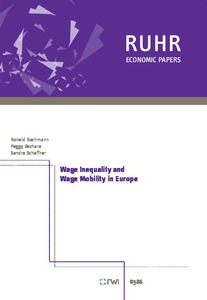Wage inequality and wage mobility in Europe
"Using data from the European Union Statistics on Income and Living Conditions (EU-SILC), this paper investigates wage inequality and wage mobility in Europe. Decomposing inequality into within and between group inequality, we analyse to what extent wage inequality and mobility can be explained...
| Main Authors: | , , |
|---|---|
| Institution: | ETUI-European Trade Union Institute |
| Format: | TEXT |
| Language: | English |
| Published: |
Bochum
2012
Ruhr-Universität |
| Subjects: | |
| Online Access: | https://www.labourline.org/KENTIKA-19120249124919484219-Wage-inequality-and-wage-mobil.htm |
| Summary: | "Using data from the European Union Statistics on Income and Living Conditions (EU-SILC), this paper investigates wage inequality and wage mobility in Europe. Decomposing inequality into within and between group inequality, we analyse to what extent wage inequality and mobility can be explained by observable characteristics. Furthermore, we investigate which individual and household characteristics determine transitions within the wage distribution. Finally, we examine the importance of institutions for wage inequality, wage mobility, and wage transitions. We find that overall, mobility reduces wage inequality. While a large part of wage inequality is due to unobservable characteristics, the equalizing effect of mobility mainly occurs within groups. Furthermore, both personal and household characteristics play an important role for wage transitions. Finally, our findings reveal large cross-country differences across Europe, which are partly linked to the institutional set-up of the national labour markets." |
|---|---|
| Physical Description: | 37 p. Digital |

